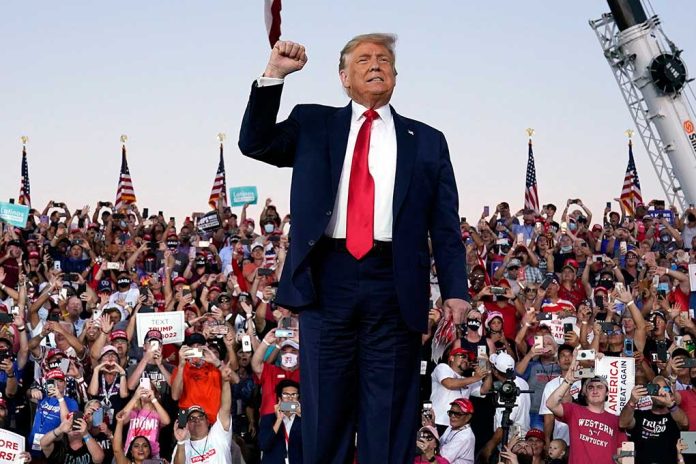
Donald Trump makes a bold move to tackle what he describes as widespread censorship, launching a sweeping initiative aimed at restoring free speech across America.
At a Glance
- Trump plans to dismantle alleged deep state censorship efforts.
- New executive orders target federal collusion in stifling free speech.
- Initiative calls for revising Section 230 and prosecuting censorship.
- Proposes a digital Bill of Rights to safeguard online speech.
Trump’s Strategy for Free Speech
President Donald J. Trump introduced his latest policy initiative to eliminate censorship and reinforce free speech in the United States. This new plan, part of Trump’s broader Agenda 47, seeks to abolish the existing “censorship industry” which, according to Trump, involves Deep State bureaucrats, Silicon Valley, and mainstream media working together to curb the voices of Americans. Trump’s initiative underscores the principle that free speech is integral to a self-governed society.
This alone puts DJT in company with the greatest U.S. presidents since Lincoln. The globalist project has laid siege to democracy and freedom across the globe. The USA is the final redoubt. President Trump just launched freedom’s counterattack. https://t.co/2brXEjTByg
— Robert F. Kennedy Jr (@RobertKennedyJr) November 9, 2024
The re-elected President proposes a series of measures to address censorship from digital platforms and government entities. This includes an executive order preventing federal agencies from censoring lawful speech. Trump aims to prohibit federal funds from supporting platforms that label domestic speech as “misinformation,” a term he believes is used to suppress alternative viewpoints and silence dissent.
Breaking Down the Initiative
Trump’s plan involves identifying and dismissing federal bureaucrats involved in any conspiracies related to censorship, thus holding them accountable. By empowering the Department of Justice to investigate and prosecute such cases, Trump intends to establish stringent checks on external influences. One major element of his initiative is the reform of Section 230 of the Communications Decency Act, which currently provides immunity to digital platforms from content posted by users. “If we don’t have FREE SPEECH, then we just don’t have a FREE COUNTRY.” remarked President Donald J. Trump.
Trump also expressed commitment to breaking up the current censorship apparatus, ceasing federal backing for related nonprofits and academic undertakings. Additionally, he seeks to enforce new laws with penalties against federal officials bypassing the U.S. Constitution, a move pointing toward redefining the government’s role in speech moderation.
Proposing a Digital Bill of Rights
Central to Trump’s vision is the introduction of a digital Bill of Rights that would offer user-defined protections in cyberspace. Among its features, this measure includes provisions for digital due process and rights for users regarding content moderation, ensuring users can see the mechanisms behind content decisions. One component targets intelligence officials, enacting a seven-year waiting period before they can join private companies overseeing U.S. data.
Trump framed the struggle for free speech as existential for both America’s survival and Western civilization. With this initiative, he aims to invigorate public discourse and reclaim what he believes is a fundamental right. Trump ends by committing to eliminate the current culture of censorship, vowing decisive action if re-elected as America’s leader once more.
Sources:
President Donald J. Trump — Free Speech Policy Initiative














